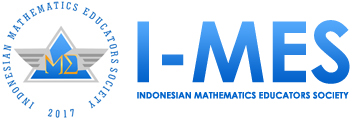Ethnomathematics Exploration in the Rekhi of Mandap and Havankunda: An Ethnography from Hindu Rites and Rituals in Nepal
Abstract
The purpose of this research is to explore the geometrical concepts embedded in Hindu rites and ritual, especially that of the rekhi of “Mandap” and “Havankunda”. This research was a qualitative with an ethnographic study. Data were obtained through observation, field note, taken the photo of the context, and documentation. Based on the study result, it was found that there were geometry-based mathematical concepts in making and applied in ‘Mandap’ and “Havankunda”. There we can see lines and angles, parallel and intersecting lines, vertically opposite angles, linear pair and alternate angles, triangles, quadrilateral, rectangle, hemisphere, circle, its center, and geometry transformation reflection, rotation, and translation. This finding can be helpful to bring mathematics closer to the reality of Hindu rituals. Besides, the conclusion of my study implies that teachers and students can explore their cultural practices and use them as the basis for teaching and learning mathematics in school.
Keywords
Full Text:
PDFReferences
Abdullah, A. S. (2017). Ethnomathematics in perspective of Sundanese culture. Journal on Mathematics Education, 8(1), 1-16.
Aliyu, A. A., Singhry, I. M., Adamu, H. A. R. U. N. A., & Abu Bakar, M. A. M. (2015). Ontology, epistemology, and axiology in quantitative and qualitative research: Elucidation of the research philosophical misconception. In Proceedings of the Academic Conference: Mediterranean Publications & Research International on New Direction and Uncommon (Vol. 2, No. 1).
Bhagat, K. K., & Chang, C. Y. (2015). Incorporating GeoGebra into geometry learning-A lesson from India. Eurasia Journal of Mathematics, Science and Technology Education, 11(1), 77-86.
Brandt, A., & Chernoff, E. (2015). The importance of ethnomathematics in the math class. Ohio Journal of School Mathematics, 71(1), 31–37.
Chen, N., Drouhard, M., Kocielnik, R., Suh, J., & Aragon, C. R. (2018). Using machine learning to support qualitative coding in social science: Shifting the focus to ambiguity. ACM Transactions on Interactive Intelligent Systems, 8(2), 1–20.
D'Ambrosio, U. (1990). The role of mathematics education in building a democratic and just society. For the Learning of Mathematics, 10(3), 20-23.
Ditasona, C. (2018). Ethnomathematics exploration of the Toba community: Elements of geometry transformation contained in Gorga (Ornament on Bataks House). IOP Conference Series: Materials Science and Engineering, 335(1), 012042.
Erbilgin, E. (2017). A Comparison of The Mathematical Processes Embedded in The Content Standards of Turkey and Singapore. Research in Social Sciences and Technology (RESSAT), 2(1), 53-74.
Fitrianawati, M., Sintawati, M., & Retnowati, M. E. (2020). Developing ethnomatematics in geometry learning for elementary schools’ students: A preliminary design. International Journal of Science and Technology Research, 9(01), 2754-2758.
Haris, D., & Putri, R.I.I. (2011). The role of context in third graders ’learning of area measurement. Journal on Mathematics Education, 2(1), 55–66
Hourigan, M., & Leavy, A. (2017). Using architecture as a context to enhance students' understanding of symmetry. Australian Primary Mathematics Classroom, 22(2), 8-13.
Ilyyana, K., & Rochmad. (2018)). Analysis of problem-solving ability in quadrilateral topic on model eliciting activities learning containing ethnomathematics. Unnes Journal of Mathematics Education Research (UJMER), 7(2), 130-137.
Mania, S., & Alam, S. (2021). Teachers' perception toward the use of ethnomathematics approach in teaching math. International Journal of Education in Mathematics, Science and Technology, 9(2), 282-298.
Maryati & Prahmana, R. C. I. (2019). Ethnomathematics: Exploration of the Muntuk community. International Journal of Scientific and Technology Research, 8(6), 47-49.
Mauluah, L., & Marsigit. (2019). Ethnomathematics for elementary student: Exploration the learning resources at Kraton Yogyakarta. International Journal of Scientific and Technology Research, 8(7), 776-780.
NCTM. (2000). Principles and Standards for School Mathematics. Reston, VA: The National Council of Theacher of Mathematics, Inc
Pais, A. (2013). Ethnomathematics and the limits of culture. For the Learning of Mathematics, 33(3), 2-6.
Pradhan, J. B. (2018). Mathematical ideas in cultural artefacts: A metaphor for teaching of school mathematics. International Journal of Scientific and Research Publications, 8(9), 335-341.
Prahmana, R. C. I., & D’Ambrosio, U. (2020). Learning geometry and values from patterns: Ethnomathematics on the Batik patterns of Yogyakarta, Indonesia. Journal on Mathematics Education, 11(3), 439-456.
Prahmana, R. C. I., Kusumah, Y. S., & Darhim. (2017). Didactic trajectory of research in mathematics education using research-based learning Didactic trajectory of research in mathematics education using research-based learning. Journal of Physics: Conference Series, 893(1), 012001.
Rosa, M., & Orey, D. (2011). Ethnomathematics: the cultural aspects of mathematics. Revista Latinoamericana de Etnomatemática: Perspectivas Socioculturales de La Educación Matemática, 4(2), 32-54.
Rosa, M., & Orey, D. C. (2011). Ethnomathematics: the cultural aspects of mathematics. RevistaLatinoamericana de Etnomatemática, 4(2). 32-54.
Rosa, M., & Orey, D. C. (2015). A trivium curriculum for mathematics based on literacy, matheracy, and technoracy: An ethnomathematics perspective. ZDM - International Journal on Mathematics Education, 47(4), 587–598.
Spradley, J. P., & McCurdy, D. W. (1989). Anthropology: The cultural perspective. Reissued Long Grove, IL: Waveland Press.
Supiyati, Hanum, F., & & Jailani. (2019). Ethnomathematics in Sasaknese architecture. Journal on Mathematics Education, 10(1), 47–58.
Tarman, B. (2016). Innovation and education. Research in Social Sciences and Technology, 1(1), 77-97.
Walter, D., & Ophir, Y. (2019). News frame analysis: An inductive mixed-method computational approach. Communication Methods and Measures, 13(4), 248-266.
Widodo, H. (2019). The role of school culture in holistic education development in Muhammadiyah Elementary School Sleman Yogyakarta. Dinamika Ilmu: Jurnal Pendidikan, 19(2), 265-285.
Refbacks
- There are currently no refbacks.

This work is licensed under a Creative Commons Attribution-NonCommercial-ShareAlike 4.0 International License.
Indonesian Journal of Ethnomathematics
Indonesian Mathematics Educators Society
Jl. Terusan Jend. Sudirman, Kec. Cimahi Tengah, Kota Cimahi, Jawa Barat 40521
E-mail: [email protected]
ISSN: 2775-8001


